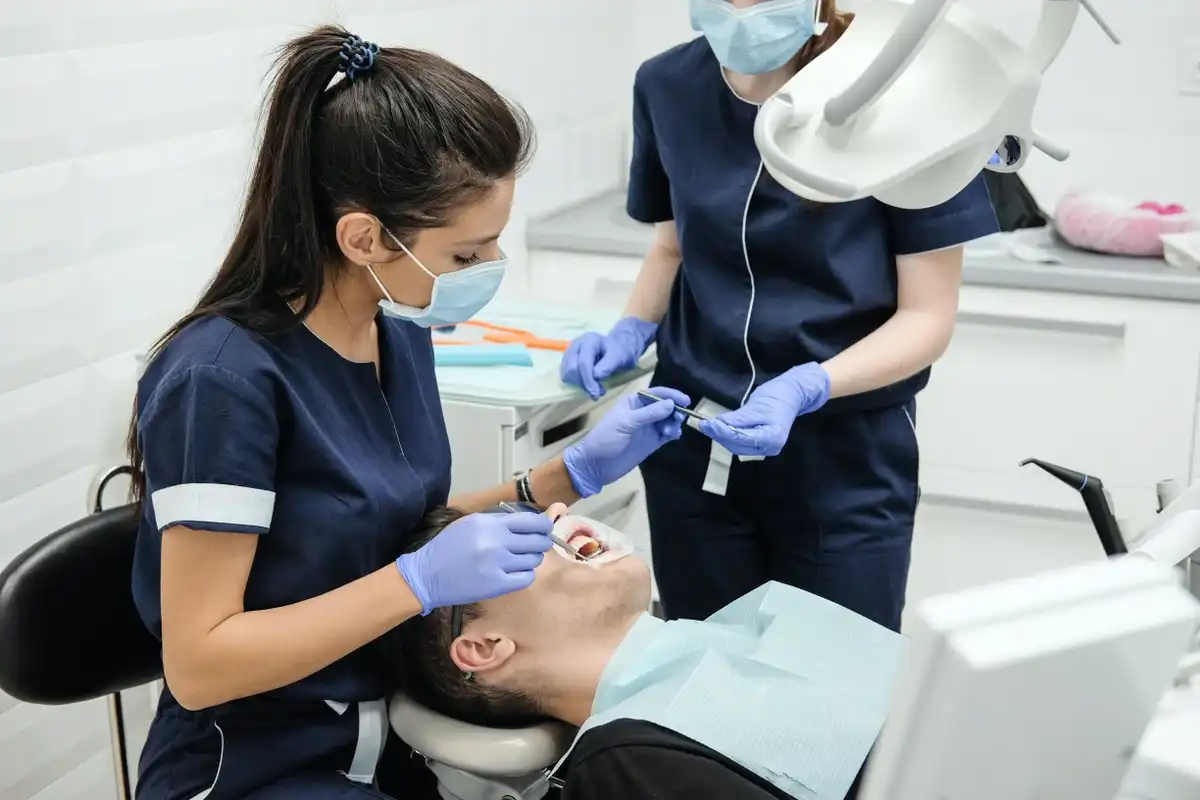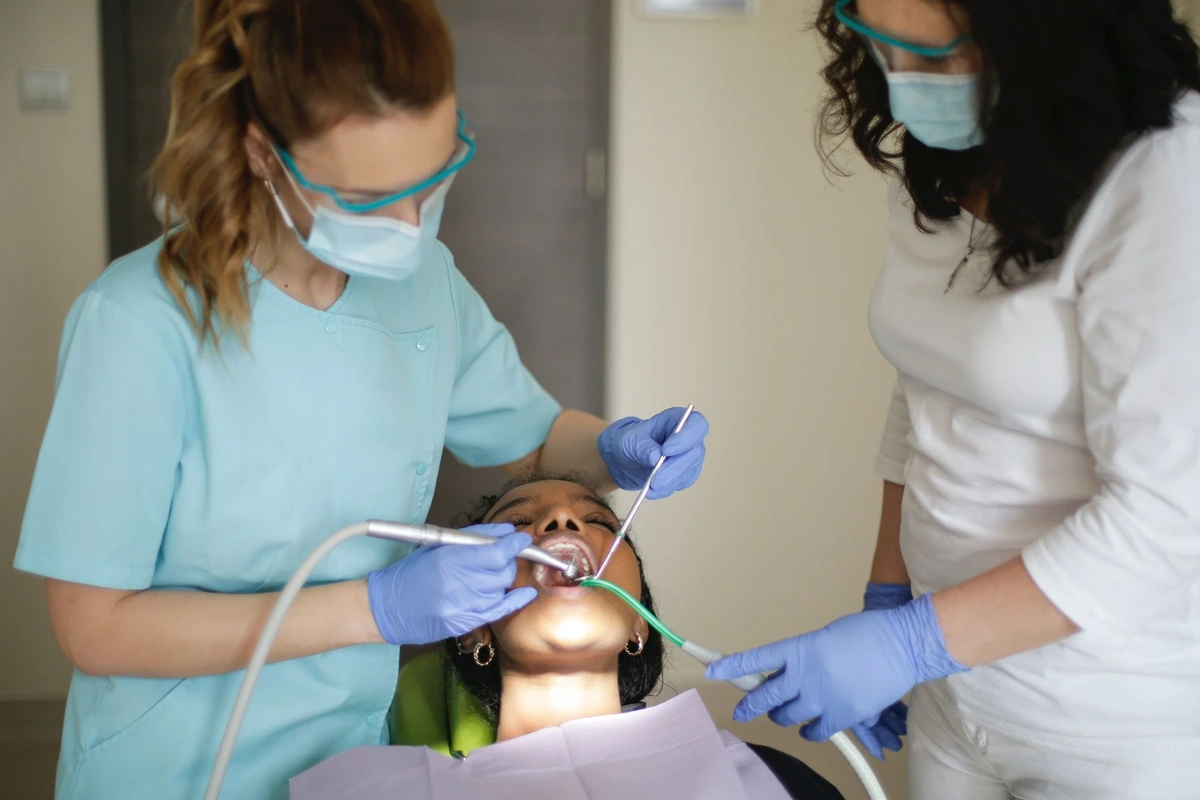How Often Should You Go To The Dentist?


The average person with healthy teeth and gums usually needs to go to the dentist for a dental cleaning about every six months. Ultimately, the frequency of your dental cleanings and how often should you go to the dentist depends on things like:
- how much tartar buildup you’re prone to getting on your teeth
- if you’re in braces
- if you have “hard to reach” or “hard to clean” areas
- how healthy your gum tissues are
- past issues, such as gum disease
- overall oral health and oral hygiene habits
As long as your oral hygiene and gums are fairly healthy (meaning there’s not severe gum pocketing or bone loss) and you only get a mild amount of tartar here and there between checkups, you probably don’t need a teeth cleaning more often than every six months. And by mild, we mean just a small amount of plaque and tartar buildup that’s barely visible on your teeth. Even those of us who brush and floss great each day can tend to see tiny areas of tartar close to our gums, between teeth, or near our saliva glands. As long as the buildup is still above your gums and not below them, you’re still in the “preventative” phase of oral health care.
Should I Get A Cleaning More Often Than Every 6 Months?
If you know someone going to the dentist more often for dental cleanings, there’s a good chance that they’re prone to heavy buildup, have hard-to-clean areas like orthodontic appliances, or they’re in what we call “periodontal maintenance”. That is, they were previously treated for gum disease and are in recovery, so to speak. When that’s the case, it’s totally normal to schedule dental visits or cleanings as frequently as every 3-4 months.
Then again, some people with good oral health just really love to get their teeth cleaned and go to the dentist more. Even though preventative dental visits usually aren’t covered more than twice a year by your insurance, it’s worth it for some people to pay out of pocket every once in a while if they have a lot of stain from their coffee, red wine, etc.
And just to clarify, there are some insurance companies out there that cover three oral hygiene cleanings a year. If they do, it doesn’t hurt to go ahead and get that extra teeth cleaning and have a jump-start on healthier gums and prevent tooth decay!
What’s The Difference Between “Periodontal Maintenance” And “Oral Prophylaxis”?
Typically, you’ll keep up with your periodontal maintenance dental visits and then — as long as your mouth stays healthy between appointments — eventually “graduate” to a prophy cleaning.
An oral “prophylaxis” appointment is your typical preventative oral health cleaning. That’s the one you schedule every six months to keep your smile healthy. Prophylaxis actually means preventative. So, if you don’t have gum disease, heavy tartar, and haven’t recently been treated for a gum infection, a “prophy” is probably all you’ll need.
Your hygienist or dentist will usually measure your bone and gum attachment levels (periodontal charting) to see which “category” of gum health you fall into. Deep pockets and tartar buildup typically call for more than just your average dental cleaning. Even if you don’t have much tartar anymore, the number of pockets that there are may just mean you need to have your teeth cleaned more frequently.

Are Different Types Of Dental Cleanings Covered By My Insurance?
Yes. Your insurance pays differently for your appointment, depending on the type of cleaning that’s rendered. Since insurance is typically built around a preventive design, it will normally cover your standard "prophy" cleanings at or close to 100%. Full coverage encourages you to schedule that teeth cleaning every six months and consequently enjoy better oral health.
But if your oral health is poor, you’re not great about flossing, and don’t schedule cleanings routinely, gum disease can start to take over. Once you reach the point of requiring deep cleanings or periodontal maintenance cleanings, your insurance coverage will start to slowly cut back.
Since insurance only covers two preventive cleanings a year, some offices will bill for those six-month visits, then schedule the perio appointments in-between, that way you’re still getting a cleaning every 3-4 months, but you only need to pay out of pocket for two of them (instead of all four.) It alternates prophy, perio maintenance, prophy…you get the picture. The appointments may all be in the same dentist’s office, or you might alternate between your dentist and a periodontist.
Can I Just Get My Dentist To File My Insurance As A Normal Cleaning?
Although it sounds simple enough, asking your dentist to file a periodontal maintenance cleaning as a regular prophylaxis actually constitutes as insurance fraud. Yikes! Since the coding is built around the current oral health status of your teeth and gums, filing the wrong codes is a serious enough offense that your dentist (and hygienist) could get slapped with thousands in fines, or even lose their license.
You might be asking yourself, “Can I just get a normal cleaning instead of a periodontal one?” Unfortunately, no. A preventive cleaning just isn’t adequate enough for cleaning those deep pockets we’ve been talking about. To proactively take steps that switch your perio maintenance cleaning to a routine prophy, be sure you’re taking great care of your gums. That includes cleaning between your teeth every day, flossing, using a water flosser, or whatever it takes to access those hard-to-reach areas. The less you clean those spots, the more tartar you’re going to have. And the more tartar you have, the harder it is to get away from a periodontal maintenance plan.
Remember, it’s your hygienist’s job to show you easy and effective ways to clean around your teeth. If you’re struggling, be sure to let them know! They’ll be able to monitor your progress between teeth cleanings to let you know if it’s ok to start spreading your visits out over further lengths of time.
When Should You Go To The Dentist?
How often you go to the dentist is different for everyone, but everyone needs a preventative dental cleaning twice a year (every six months.) But if you have a history of gum disease and heavy tartar buildup, you’ll probably need to schedule a cleaning every 3-4 months. Different types of cleanings (prophy vs. periodontal maintenance) are covered differently by your insurance. The type of cleaning you need will depend on your oral hygiene and oral health status. Bottom line, it’s never a bad idea to go to the dentist and have your teeth cleaned more frequently!

Make your inbox smile!
Subscribe






